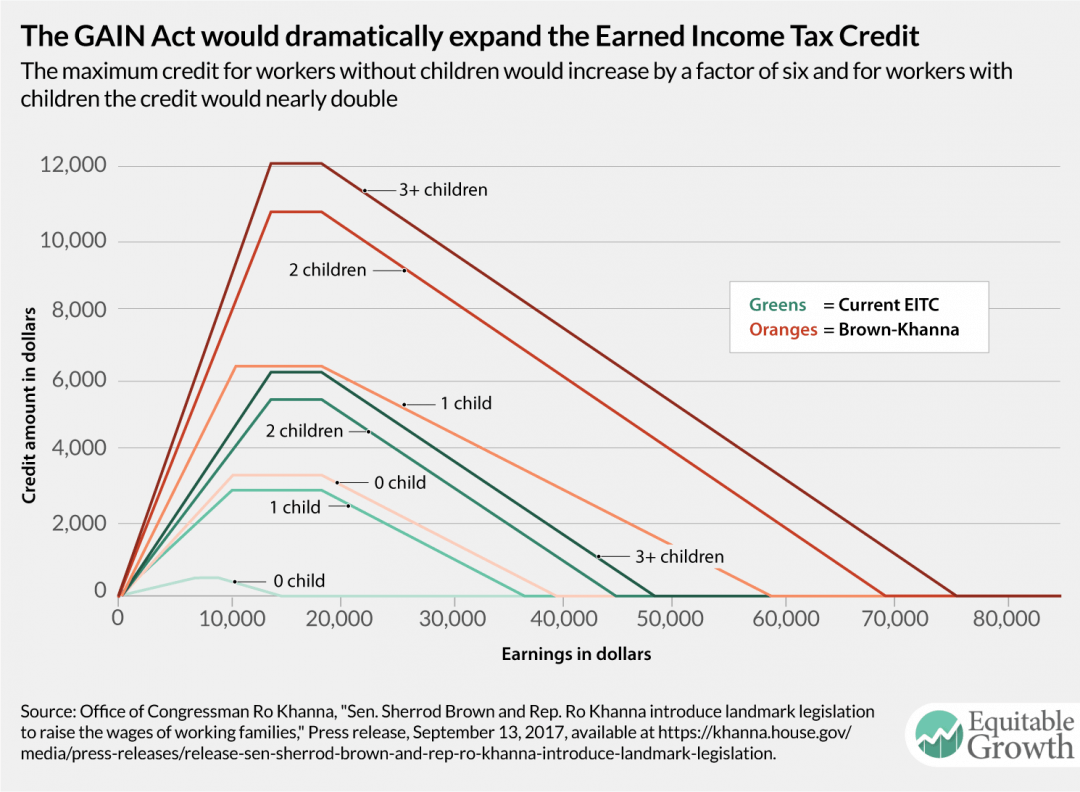Expanding the Earned Income Tax Credit is worth exploring in the U.S. tax reform debate

In recent years, lawmakers on both sides of the congressional aisle have proposed expanding refundable tax credits for low-income workers across the United States such as the Earned Income Tax Credit, which provides them with additional earnings through the tax code. But a new proposal by Rep. Ro Khanna, D-CA, and Sen. Sherrod Brown, D-OH, hopes to go much further to make up for decades of stagnant wages.
The Grow American Income Now, or GAIN, Act proposed by Rep. Khanna and Sen. Brown would expand the Earned Income Tax Credit not only for low-wage working families with children but also for middle-income families and childless workers by increasing the income level for EITC eligibility. The EITC already is one of the country’s largest poverty-fighting cash-transfer programs—as a result of the program’s expansion in the early 1990s and then again under the American Recovery and Reinvestment Act of 2009—designed to explicitly boost the living standards of low-wage workers and families, but research shows the program could be even more successful if expanded further.
Last year, economists Hilary Hoynes and Jesse Rothstein of the University of California, Berkeley examined (open access version) how well the EITC accomplished its goals of redistribution, encouraging work, and limiting administrative costs and noncompliance. Hoynes and Rothstein argued then that policymakers could make the tax credit more progressive by expanding it for workers without children. This is one major revision that the GAIN Act has taken on board. In addition, the proposed bill would lower the qualifying age for the EITC from 25 years to 21 years, expanding eligibility to an even larger group of low-wage workers. What’s more, the GAIN Act proposes to nearly double the EITC for working families and increase the credit for childless workers almost sixfold.
As would be expected for such an ambitious proposal, it would be very expensive. The nonpartisan Tax Policy Center estimates the proposal would cost $1.4 trillion from fiscal year 2017 to fiscal year 2026. Under the proposal, the maximum tax credit available increases to $12,131 for families with three or more qualifying children; $10,783 with two qualifying children; $6,528 with one qualifying child; and $3,000 with no qualifying children. (See Figure 1.)
Figure 1

The proposed legislation also would allow for recipients to receive EITC advances capped at $500 each taxable year, which is subtracted from their total credit when they file their annual tax return. As Congress takes on tax reform in the next few months, there is sure to be talk of reforming the EITC. The GAIN Act is an interesting proposal and is worth exploring as part of tax reform to boost low- and moderate-wage workers’ earnings.
